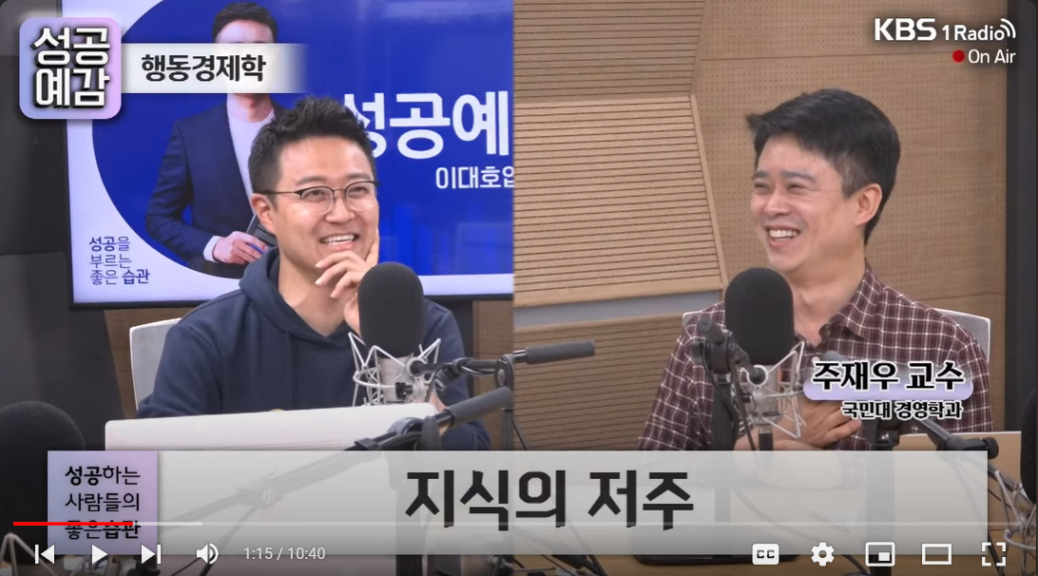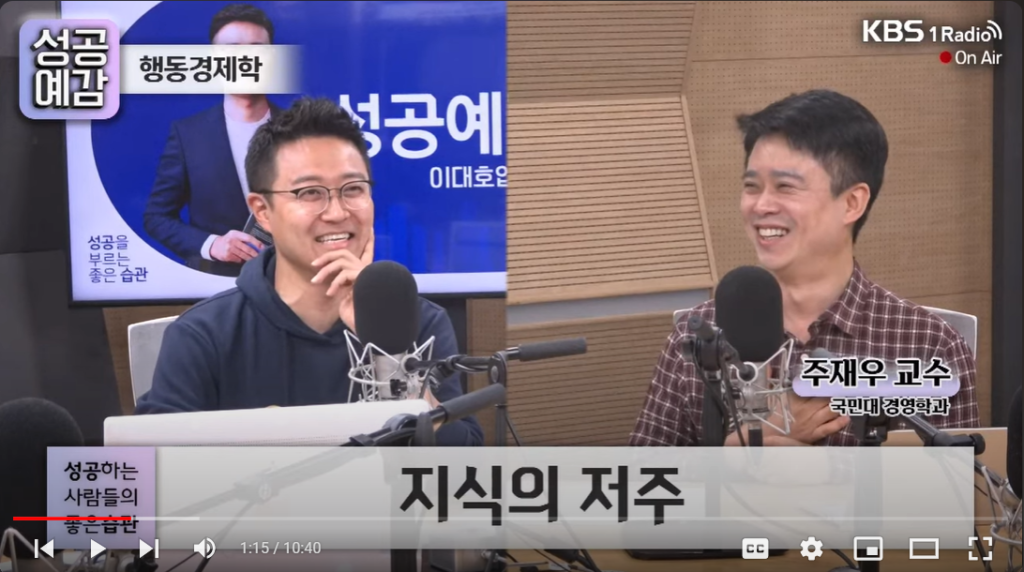뭔가 많이 알고 있는 사람, 학식이 높은 사람, 전문 지식이 많은 사람이 지식의 저주에 빠지는 경우가 많겠네요.
– 지식이 깊어지면 지식을 모르는 상태가 어떤지 상상하기 어렵다는 개념은 굉장히 흥미로워요. 왜냐하면 일반적으로 지식이 많아지는 건 좋은 일인데, 잘 모르는 사람과 의사소통 할 때에는 나쁜 일이 됩니다. 학생을 가르치는 교수나 직원과 일하는 기업의 임원이 지식의 저주에 빠지기 쉽습니다.
– 한 기업의 직원분이 흥미로운 사례를 알려주셨어요. 사장님 보고 자료를 만들 때, 팀장님이 ‘수묵화’ 풍으로 만들어 달라고 하셨답니다. 자료가 수묵화풍이라는 게 색감인지 의미인지, 색감이면 흑백인지 여백의 미인지, 의미라면 큰 그림 속에 디테일을 의미하는 건지… 설명해주지 않으셨다고 합니다.
2023.10.12
*행동경제학개론
지식의 저주
– 나만 알고 있는 #정보 의 적용에서 오는 오류
– #지식 의 저주와 비효율성
– 좋은 #소통 과 #자영업자 의 참고점 등
– #주재우 교수 (국민대 경영학과) #KBS1라디오 #경제라디오 #성공예감이대호입니다 #성공예감 #이대호
***
Reference 1
Camerer, C., Loewenstein, G., & Weber, M. (1989). The curse of knowledge in economic settings: An experimental analysis. Journal of political Economy, 97(5), 1232-1254.
In economic analyses of asymmetric information, better-informed agents are assumed capable of reproducing the judgments of less-informed agents. We discuss a systematic violation of this assumption that we call the “curse of knowledge.” Better-informed agents are unable to ignore private information even when it is in their interest to do so; more information is not always better. Comparing judgments made in individual-level and market experiments, we find that market forces reduce the curse by approximately 50 percent but do not eliminate it. Implications for bargaining, strategic behavior by firms, principal-agent problems, and choice under uncertainty are discussed.

—
Reference 2
A Better Way to Ask for Advice (By Adam Grant, October 25, 2023, @ Behavioralscientist.org)
… In a clever study, economists wanted to find out whether students really learn more from experts. They collected data on every freshman at Northwestern University from 2001 to 2008. They investigated whether freshmen did better in their second course in a subject if their introductory class was taught by more qualified instructors.
You might assume that students would be better off learning the basics from an expert (a tenure‑track or tenured professor) than a nonexpert (a lecturer with less specialized knowledge). But the data showed the opposite: students who took their initial class with an expert ended up with poorer grades in the next class.
The pattern was robust across fields: students learned less from introductory classes taught by experts in every subject. It held across years—with over 15,000 students—and in courses with tougher as well as easier grading. And the experts were especially bad at teaching students who were less academically prepared.
It turns out that if you’re taking a new road, the best experts are often the worst guides. There are at least two reasons why experts struggle to give good directions to beginners. One is the distance they’ve traveled—they’ve come too far to remember what it’s like being in your shoes. It’s called the curse of knowledge: the more you know, the harder it is for you to fathom what it’s like to not know. As cognitive scientist Sian Beilock summarizes it, “As you get better and better at what you do, your ability to communicate your understanding or to help others learn that skill often gets worse and worse.” …
… It’s often said that those who can’t do, teach. It would be more accurate to say that those who can do, can’t teach the basics. A great deal of expert knowledge is tacit—it’s implicit, not explicit. The further you progress toward mastery, the less conscious awareness you often have of the fundamentals. Experiments show that skilled golfers and wine aficionados have a hard time describing their putting and tasting techniques—even asking them to explain their approaches is enough to interfere with their performance, so they often stay on autopilot. When I first saw an elite diver do four and a half somersaults, I asked how he managed to spin so fast. His answer: “Just go up in a ball.” Experts often have an intuitive understanding of a route, but they struggle to articulate all the steps to take. Their brain dump is partially filled with garbage….


고등학생 당시 조금 죄송하지만 별로 좋아하지 않던 선생님이 있었다. 국어 담당 선생님이었던 것으로 기억하는데 사투리가 굉장히 심하신 데다가 강의력도 그다지 좋지 않으셨다. 충분한 설명이 뒷받침되지 않은 채 진도만 훌쩍 나가는 것이 다반사였다. 그렇다 보니 대부분의 반 친구들이 그 선생님의 수업 때는 자거나 다른 공부를 하곤 하였다. 그런데 어느 날 우연히 그 선생님이 서울대 출신이란 것을 듣게 되었다. 그 이야기를 들은 나는 “서울대 출신이시면 분명 공부도 잘하고 똑똑하실 텐데 왜 이렇게 수업을 못 하실까?”라는 생각을 하였다. 그때는 그저 그런 궁금증을 남긴 채 잊혀졌는데 몇 년이 지나 지금, ‘지식의 저주’라는 행동경제학 용어를 듣고 다시 머릿속에 떠오르게 되었다.
‘지식의 저주’란 어떤 개인이 다른 사람들과 의사소통을 할 때 다른 사람도 이해할 수 있는 배경을 가지고 있다고 자신도 모르게 추측하여 발생하는 인식적 편견이다. 이것은 교육자들에게 자주 발생하는 오류인데, 박식한 교육자들이 그렇지 못한 학습자를 가르치다 보니 괴리가 생기는 것이다. 그 선생님도 마찬가지였을 것이다. 본인이 너무나 쉽게, 그리고 당연하게 받아들였던 지식들이 누군가에게는 당연하지 않았다는 사실을 간과한 것이다.
이것 말고도 또 ‘지식의 저주’에 관한 경험이 있다. 이번에는 내가 ‘저주’에 갇힌 사례이다. 나는 군 복무 중이었던 때의 공백을 제외하고는 계속 맥도날드에서 아르바이트를 하고 있다. 몇 년이나 일을 하다 보니 일에 굉장히 익숙해지고 잘하게 되어 ‘팀리더’라는 직책으로 진급하게 되었다. ‘팀리더’는 레스토랑 업무의 전반을 지휘하는 팀리딩을 하면서 새로운, 또는 기존의 아르바이트생들을 교육하는 역할이 있다. 처음 교육을 시작했을 때 항상 드는 생각은 ‘이걸 왜 못하지?”라는 생각이었다. 너무도 당연하고 쉽고 자연스러운 일이 그들에겐 그렇지 않았다. 지금 와서 생각해보면 이런 태도로 교육을 하다 보니 내가 의도했던 정보와 절차가 그들에게 잘 전달되지 않았을 것이다. 그렇다 보니 교육생들은 내가 의도했던 것과는 다르게 행동하거나 실수를 하는 일이 자주 발생하였다. 이런 일이 계속 반복되다 보니 나는 어느 순간 내가 무언가를 간과하고 있다는 것을 깨달았다. 결국 나도 지식의 저주에 걸려버린 것이었다. 교육생들은 몇 년이나 일을 했던 나의 업무능력과 지식을 따라올 수 없었다. 나도 처음 일을 시작했을 때는 분명 똑같이 교육생의 위치에서 버벅거리고 실수하면서 지금에 온 것인데 결국 어릴 적을 잊어버린 개구리가 된 것이었다. 그 이후로 나는 교육을 할 때 교육생을 ‘믿지 않기로’했다. 정말 세세한 것 하나부터 과하다 싶을 정도로 설명을 하게 되었고 내 나름대로 교육의 절차를 나누어 한 절차가 끝나면 교육생에게 즉각적인 질문을 받으면서 피드백 할 기회를 제공했고 소통하는 교육을 하기 위해 노력하고 있다.